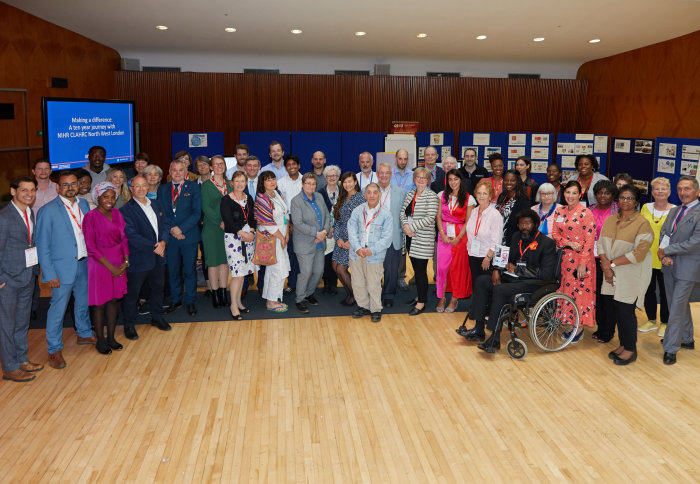£9m fund to collaboratively improve healthcare in NW London through research

The NIHR CLAHRC NWL team, June 2019
£9 million government award for Northwest London part of a £135 million research fund to tackle the biggest healthcare challenges of this generation.
Announced today, the new Applied Research Collaboration (ARC) funding for applied health and care research will support implementation of research into practice, making tangible improvements for patients, the public and to health and care services.
Fifteen partnerships across England, made up of NHS organisations, social care services, leading academics, innovators, and local authorities, have been awarded funding through the National Institute for Health Research (NIHR). This investment will drive ground-breaking new projects that will address the increasing demands on the NHS and give patients greater independence and choice about how they manage their healthcare.
The NIHR ARC Northwest London will be hosted by Chelsea and Westminster NHS Foundation Trust, with Imperial College London as the main academic partner.

Professor Azeem Majeed, who will take up the role of Director of the NIHR ARC Northwest London from 1 October 2019, said: "This builds on our previous work, with a shift towards a public health focus, working with local partners in government, NHS and the community to collaboratively address major health needs in our area.
"It will support the NHS to implement its Long Term Plan and improve health across the whole of northwest London."
Ms Lesley Watts, chief executive of Chelsea and Westminster, said: "This investment by the government is excellent news, not only to the Trust as a host organisation, but to our partners, our patients and our staff. The funding presents a real opportunity for collaborative working, making a difference to our patients locally and nationally.
"As we strive to be the best Foundation Trust we can be, we know that we must invest in new models of care, built around the strongest evidence base. Being a part of this collaboration will enable us to meet the changing needs of the population we serve, in a realistic timescale. We look forward to working with each of the partners across the network and being a part of such vital research."
Health Minister Nicola Blackwood said: "As the population grows and demand on the NHS increases, it is paramount we develop the next generation of technologies and improve the way we work to ensure the NHS continues to offer world-leading care."
“The UK has a proud history of cutting-edge health research and by supporting the great minds in health and social care, this funding has the potential to unlock solutions to some of the biggest challenges facing healthcare and revolutionise the way patients access treatments in the future.”
Building on the success of the CLAHRC Northwest London
This new collaboration can be seen as an evolution of the successful NIHR Collaboration for Leadership in Applied Health Research and Care (NIHR CLAHRC) Northwest London. This was one of just nine CLAHRCs, and the first in London, originally established in October 2008. This was expanded to 13 CLAHRCs nationally in 2013.

A major ongoing success story of the this CLAHRC is a programme to improve services for people with sickle cell disease, a chronic, previously life-limiting condition that affects red blood cells.
In partnership with the Sickle Cell Society and the Picker Institute Europe, the team developed the first patient reported experience measure (PREM) for people with sickle cell and conducted the largest-ever survey of people with the condition. Over 700 people, or around 1 in 13 with sickle cell in the UK, were involved, leading to a validated survey that supports hospitals and healthcare to improve services for patients.
Ganesh Sathyamoorthy, Assistant Director for Partnerships and Business Development NIHR CLAHRC for Northwest London and Trustee at the Sickle Cell Society said:
"All of the major sickle cell centres in London, where half of those with the condition live, now use this tool. And as one in 250 children born in the UK are now carriers of disease, the next push is to expand nationally, to ensure everyone with sickle cell can benefit."
A focused approach for continual improvement
The NIHR ARC Northwest London’s programme of work will be conducted via four research themes and three cross-cutting themes. The overarching goal is to build sustainable infrastructure for a continual improvement in health behaviours and population health, and a reduction in health inequalities for the people of northwest London.
The Child Population Health, Multimorbidity, and Digital Health themes aim to address local and national priorities, exploiting the strengths of committed healthcare professionals, academics and patients. These themes aim to achieve major population health impact, learning from and contributing to international experience.
The fourth research theme, Innovation and Evaluation, will contribute to northwest London infrastructure, capitalising on world-class discovery science in the Imperial AHSC. This will drive the rapid spread of innovations in prevention, early diagnosis and better, targeted treatments, to benefit patients, including frugal innovations from low and middle-income countries, sharing learning within and beyond the local area.
The four research themes will be supported by three cross-cutting themes: Information and Intelligence; Patient, Public, Community Engagement and Involvement; and Collaborative Learning and Capacity Building. They will produce generalizable research on how to maximise the efficiency of health improvement programmes and support high quality services.
Underpinning informatics
Underpinning this work will be significant investments in informatics capability in NW London. This includes information from the Whole Systems Integrated Care (WSIC) Programme, which was established to facilitate better co-ordinated care, particularly for patients with complex health needs.
The primary care, acute, mental health, community and adult social care data for 2.2 million people contained within it will drive the evaluation of patient journeys through the health and care system in northwest London.
Article supporters
Article text (excluding photos or graphics) © Imperial College London.
Photos and graphics subject to third party copyright used with permission or © Imperial College London.
Reporter
Mr Al McCartney
Faculty of Medicine Centre